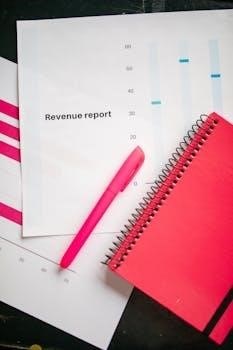Certified Management Accountant (CMA) Study Guide PDF⁚ A Comprehensive Plan
Embarking on the CMA journey requires a strategic approach. A comprehensive study guide in PDF format serves as your roadmap, providing structured guidance, expert tips, and essential resources. It ensures effective preparation and confident navigation through the CMA exam process.
The Certified Management Accountant (CMA) exam is a rigorous assessment designed to validate expertise in financial accounting and strategic management. It signifies mastery of critical skills, making you a valuable asset. Successful completion enhances career opportunities, opening doors to leadership roles within organizations. Preparing effectively is key. With a well-structured study plan, you can conquer challenges.
The CMA certification distinguishes you as a professional capable of driving performance and making strategic financial decisions. The exam covers financial planning, analysis, control, and decision support.
A solid understanding of these concepts is crucial for success. Embrace thorough preparation and position yourself for a rewarding career in management accounting. Start with a comprehensive study guide.
Importance of Thorough Preparation
Thorough preparation is paramount for conquering the CMA exam and unlocking career potential. The CMA exam is challenging, demanding a deep understanding of complex topics. A well-structured study plan, incorporating quality resources, ensures comprehensive coverage of the syllabus. Adequate preparation builds confidence, mitigates test anxiety, and maximizes the chances of success.
Investing time and effort in studying is essential. It is a strategic move that pays dividends in professional growth. Utilizing effective study techniques, such as practice questions and mock exams, reinforces learning and improves retention. Remember, thorough preparation is the cornerstone of CMA success. It sets you apart and demonstrates a commitment to excellence, building a foundation for a brighter future.

CMA Exam Structure and Content
Understanding the CMA exam structure is crucial for effective preparation. The exam consists of two parts, each focusing on specific domains. Familiarizing yourself with the content ensures targeted study and efficient time allocation.
Part 1⁚ Financial Planning, Performance, and Analytics
Part 1 of the CMA exam delves into the crucial aspects of financial planning, performance management, and data analytics. Candidates must demonstrate proficiency in areas such as budgeting, forecasting, variance analysis, cost management, and internal controls. A strong understanding of these concepts is essential for effective decision-making within organizations.
Furthermore, the exam assesses candidates’ ability to analyze financial statements, evaluate investment opportunities, and manage risk. Proficiency in data analytics techniques, including regression analysis and data visualization, is also vital. Mastering these skills equips candidates to provide valuable insights and drive strategic initiatives. Thorough preparation, utilizing study guides and practice questions, is key to success in Part 1. This section ensures CMAs are well-versed in the core principles of financial management and analysis.
Part 2⁚ Strategic Financial Management
Part 2 of the CMA exam focuses on strategic financial management, requiring candidates to demonstrate expertise in corporate finance, decision analysis, risk management, and investment decisions. This section assesses the ability to apply financial principles to long-term planning and value creation. Candidates must understand capital budgeting techniques, mergers and acquisitions, and international finance.
Furthermore, the exam explores ethical considerations and corporate governance. Strong analytical and problem-solving skills are essential for success in Part 2. Candidates must be able to evaluate complex scenarios and make informed recommendations. Utilizing comprehensive study materials and practice questions is vital for mastering these concepts. This section ensures CMAs possess the strategic acumen to guide organizations toward financial success and sustainable growth. Effective preparation is key to confidently tackling Part 2.

Study Resources and Materials
To effectively prepare for the CMA exam, candidates need access to comprehensive study resources. These materials include official IMA publications, review courses from providers like Gleim and Surgent, and free resources such as those offered by Zain Academy.
Official IMA Study Materials
The Institute of Management Accountants (IMA) provides official study materials that form a solid foundation for CMA exam preparation. These resources are specifically designed to align with the exam content and learning objectives; Candidates benefit from the authoritative content, reflecting the IMA’s expertise in management accounting.
These official materials often include comprehensive textbooks, practice questions, and online resources. They are invaluable for understanding the core concepts and developing the necessary skills to succeed on the CMA exam. Utilizing these materials ensures candidates are learning directly from the source, enhancing their confidence and preparedness.
Accessing and utilizing official IMA study materials is a recommended first step in creating a robust and effective CMA exam study plan. They provide a clear understanding of what to expect on the exam.
CMA Review Courses (Gleim, Surgent, Becker, HOCK)
Several reputable CMA review courses, including Gleim, Surgent, Becker, and HOCK, offer structured learning paths to help candidates prepare for the exam. Each course provides comprehensive study materials, practice questions, and mock exams designed to simulate the actual testing environment.
These courses often incorporate adaptive learning technologies, identifying areas where candidates need additional support and tailoring the study experience accordingly. Expert instructors provide guidance and support, helping candidates navigate challenging topics and develop effective study strategies.
Selecting the right review course depends on individual learning preferences, study styles, and budget. Comparing the features, benefits, and pricing of each course is essential to making an informed decision and maximizing exam preparation efforts. They offer everything you need to effectively pass the CMA exam.
Free CMA Study Materials and Resources (Zain Academy)
Zain Academy offers a wealth of free CMA study materials and resources designed to support candidates in their exam preparation journey. These resources include comprehensive study guides, exam questions, essay questions, activity books, and learning videos, providing a well-rounded approach to learning.
Access to these free materials allows candidates to supplement their existing study resources or explore the CMA curriculum before investing in a full review course. By utilizing these free resources, candidates can gain a better understanding of the exam content and identify areas where they need further focus.
Zain Academy’s commitment to providing accessible and affordable CMA preparation resources makes it a valuable asset for aspiring CMAs, ensuring that financial constraints do not hinder their pursuit of professional certification. Boost your Certified Management Accountant exam prep with expertly crafted resources.
Effective Study Strategies
To conquer the CMA exam, adopt effective study strategies. This includes creating a personalized study plan, allocating sufficient study time, and consistently utilizing practice questions and mock exams to reinforce learning and identify weak areas.
Creating a Personalized Study Plan
Crafting a personalized study plan is paramount for CMA exam success. Begin by assessing your strengths and weaknesses across exam topics. Allocate more time to challenging areas and less to subjects where you are proficient. Utilize available resources, such as online platforms, to adapt the plan to your schedule.
Break down the syllabus into manageable weekly goals, ensuring consistent progress. Incorporate regular self-assessments to track your understanding and adjust the plan accordingly. Remember, flexibility is key – adapt the plan as needed to accommodate unforeseen circumstances. A well-structured, personalized plan maximizes efficiency and minimizes wasted effort. By tailoring your approach, you can optimize your study time and increase your confidence.
Recommended Study Time (240-300 Hours Per Part)
Allocate sufficient study time for each CMA exam part to ensure adequate preparation. Experts recommend dedicating between 240 and 300 hours per part. This timeframe allows for thorough coverage of the syllabus and ample practice. Factor in your learning style and pace when determining your individual study hours.
Consistency is key; schedule regular study sessions rather than cramming. Divide the total hours across the weeks leading up to the exam, creating a manageable weekly schedule. Use practice questions and mock exams to gauge your progress and identify areas needing more attention. Remember, quality over quantity – focus on effective learning rather than just clocking hours. Adjust your study time as needed based on your performance and understanding.
Utilizing Practice Questions and Mock Exams
Practice questions and mock exams are crucial for CMA exam success. Integrate them throughout your study process to reinforce learning and assess readiness. Practice questions help solidify understanding of concepts and identify weak areas. Use them after studying each section to test your knowledge. Mock exams simulate the actual exam environment, improving time management and reducing test anxiety.
Take mock exams under timed conditions to replicate the pressure of the real exam. Analyze your performance on both practice questions and mock exams to pinpoint areas needing further study. Focus on understanding the reasoning behind correct and incorrect answers. Utilize the feedback to refine your study plan and improve your overall exam preparation. Regularly engaging with these resources will significantly boost your confidence and performance.

Test-Taking Tips and Strategies
Mastering test-taking strategies is vital for CMA exam success. Effective time management, careful question analysis, and strategic guessing can significantly improve your score. Stay calm, focused, and confident during the exam to maximize your performance.
Managing Time Effectively
Time management is paramount during the CMA exam. Allocate time wisely for each question, avoiding excessive focus on any single one. Practice pacing yourself with mock exams to simulate real test conditions. If a question stumps you, mark it and return later, ensuring all questions receive attention.
Develop a strategy for each section, adhering to it strictly to prevent running out of time. Utilize the exam interface to track your progress, noting time remaining and questions unanswered. Remember that consistent practice under timed conditions is key to mastering efficient time allocation.
Prioritize questions you can answer quickly to build momentum and confidence. Don’t hesitate to make educated guesses on challenging questions if time is running short. Effective time management minimizes stress and maximizes your chances of completing the exam within the allotted timeframe.
Navigating Multiple-Choice Questions
Mastering multiple-choice questions is crucial for CMA exam success. Begin by carefully reading each question and identifying the core concept being tested. Eliminate obviously incorrect answers to narrow down your choices and increase your odds. Look for keywords and phrases that connect the question to the correct answer.
If unsure, use the process of elimination to rule out options that contradict your understanding. Consider all aspects of the question before selecting the best answer, even if multiple choices seem plausible. Avoid overthinking; trust your initial instinct unless you find concrete evidence to the contrary.
Practice with a variety of multiple-choice questions to familiarize yourself with different question formats and improve your critical thinking skills. Review your answers thoroughly to identify patterns of errors and refine your approach to future questions. Remember, a strategic and well-practiced method is essential for navigating multiple-choice questions effectively.

CMA Exam Registration and Fees
To register for the CMA exam, ICMA approval is essential, requiring an authorization letter. Exam fees apply, with specific rates for student/academic members. Understanding these steps ensures a smooth registration process.
ICMA Approval and Authorization Letter
Before you can schedule your CMA exam, securing approval from the Institute of Certified Management Accountants (ICMA) is a mandatory first step. This process culminates in the issuance of an authorization letter, a critical document that validates your eligibility to sit for the examination. Gaining ICMA approval typically involves meeting specific educational and professional requirements, which might include submitting transcripts and documenting relevant work experience.
The authorization letter serves as your official permission slip, allowing you to proceed with scheduling your exam appointment. Without this letter, you will be unable to register for a testing slot. Therefore, it’s vital to initiate the ICMA approval process well in advance of your desired exam date to avoid any delays. Ensure all required documentation is complete and submitted accurately to expedite the review and approval process and receive your authorization letter promptly.
Exam Fee Information
Understanding the financial commitment involved in pursuing the CMA certification is crucial for effective planning. The CMA exam entails specific fees that candidates must be prepared to cover. Typically, these fees encompass an initial entrance fee to the CMA program, which grants access to various resources and benefits. Furthermore, each part of the CMA exam (Part 1 and Part 2) has its own designated exam fee, payable at the time of scheduling your test appointment.
It’s important to note that the exam fees may differ for student or academic members compared to professional members. Therefore, verifying the applicable fee structure based on your membership status is essential. Additionally, be aware of any potential rescheduling fees should you need to change your exam date. Staying informed about the exam fee information helps you budget effectively and avoid any unexpected financial burdens throughout your CMA journey. Always consult the official ICMA website for the most up-to-date and accurate fee details.

